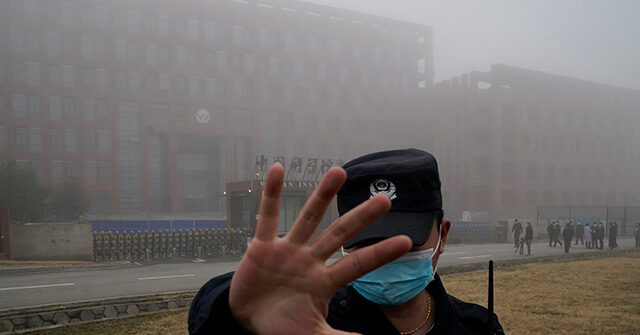The World Health Organization (W.H.O.) issued statements to the Chinese state propaganda outlet Global Times on Wednesday stating that its experts do not believe the surge in respiratory infection cases at Chinese hospitals is unusual and no emergency declarations have been issued.
China is seeing an increase in hospital visits nationwide as a result of a variety of respiratory viral infections, including influenza, Wuhan coronavirus, Mycoplasma pneumoniae, and Human Metapneumovirus (HMPV). The latter has prompted the most alarm, particularly in international media where many outlets have compared the situation ongoing this winter season to the chaotic early days of the Wuhan coronavirus pandemic.
Unlike the virus that causes Wuhan coronavirus infection, SARS-CoV-2, HMPV is not a novel virus and has been spread around the world for decades. Nonetheless, Chinese social media outlets have Citizens on China’s heavily controlled social media outlets are expressing panic over the situation, sharing footage of overcrowded hospitals, claiming the infection situation is “mayhem,” and accusing the hospitals of turning away patients, according to Radio Free Asia (RFA). The Chinese video app Douyin, known in the West as Tiktok, has especially seen a rise in the number of videos warning about the public health situation in several major cities.
The situation is especially concerning as China prepares to ring in the Lunar New Year, which will begin on January 29. The holiday is typically the business travel period of the year in China and much of Asia. In 2020, Lunar New Year travel facilitated the spread of the novel coronavirus out of Wuhan, which 5 million people left in anticipation of the holiday before the world became aware of the severity of the disease outbreak there – and before the brutal lockdowns that China made a national policy for years before widespread protests ended them.
RFA reported on Wednesday that Chinese public health officials have ordered civilians to wear sanitary masks, claiming influenza is the most common infection.
“With the coming of the … Spring Festival holidays, there will be more personal travel and visits to relatives and friends,” the Beijing Center for Disease Control (CDC) warned. “You should wear a mask correctly when taking public transportation or going to crowded and relatively closed places.”
On social media, RFA reported, users are posting warnings about crowded hospitals and poor service – which the government, for now, has yet to censor, perhaps to discourage patients from going to hospitals to limit crowding.
“H1N1 influenza in Shanghai is causing mayhem! The hospitals are overcrowded. Parents, please protect your children. Try to avoid crowded places!” one social media users warned.
“The emergency rooms can’t see everyone, and are just handing out medicines or telling people to stay home,” another user warned.
Chinese civilians using pseudonyms told the outlet that they fear that “a whole lot of different viruses” are spreading and they could not trust the government to be transparent about what they are. In Wuhan, one resident said that the hospitals are full because patients are seeking IV fluids, “but the seats to get IV fluids are all full in the community hospitals.”
Unlike in the United States, where people with viral respiratory infections typically focus on drinking fluids and managing symptoms with over-the-counter medication, it is common in China for patients to go to hospitals for IV infusions, driving higher foot traffic to hospitals. Urgent care clinics and private practices are also less common, meaning more patients resort to hospitals first. Some scientists have recommended that China limit the use of intravenous infusions when medicine taken orally is a viable alternative.
According to the Global Times, the W.H.O. issued a statement reaffirming that HMPV is not a new virus and refusing to describe the current situation as a public health emergency.
“China’s reported levels of respiratory infections are within the usual range for the winter season,” the W.H.O. statement read. “Authorities report that hospital utilization is currently lower than this time last year, and there have been no emergency declarations or responses triggered.”
The U.N. agency acknowledged a “rise in the number of common respiratory infections in the country,” but described them as “expected” in the Northern Hemisphere winter. The W.H.O. also appeared to praise China’s communist public health apparatus and cited the Chinese Center for Disease Control (CDC) as its source of information that suggests the situation in the country is typical and not cause for alarm.
“The organization assured that China has a sentinel surveillance system for influenza-like illnesses and severe acute respiratory infections,” the Global Times reported. “According to China CDC data, the pathogens causing these infections are known ones, and they include the seasonal influenza virus, RSV (respiratory syncytial virus), HMPV, and SARS-CoV-2 (the virus that causes COVID-19).”
The W.H.O. also added that influenza infections were still “by far the most common” and were still increasing in the new year.
The Chinese government has been insisting when asked that the situation is under control and visitors should not hesitate to travel to China.
“Respiratory infections tend to peak during the winter season in the Northern Hemisphere,” Foreign Ministry spokeswoman Mao Ning told reporters on January 3, responding to a question about foreign governments addressing the infections. “The diseases appear to be less severe and spread on a smaller scale compared with the previous year. I can assure you that the Chinese government cares about the health of Chinese citizens and foreigners in China.”
“It is safe to travel in China,” she reiterated.
The Foreign Ministry again responded to a question on respiratory disease on Tuesday.
“The Chinese government has and will continue to release information about infectious diseases in a timely and transparent way in accordance with law,” spokesman Guo Jiakun told reporters.
Asked if China was still safe to visit, he answered, “I’d refer you to competent authorities.”



